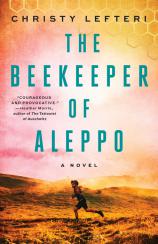Interview: September 12, 2019
Back in June, when Carol Fitzgerald was at Book Expo, she had the opportunity to chat with Christy Lefteri, the author of THE BEEKEEPER OF ALEPPO, which is a Bookreporter.com Bets On pick. They tried to do an on-the-fly video interview, but there was too much ambient noise in the room. As a result, their discussion is transcribed here.
Carol Fitzgerald: Tell us a bit about your book.
CL: It’s about Nuri and Afra, who are refugees who have left Syria. They’re forced to flee, and they make a really precarious, dangerous journey across Turkey, and through various parts of Greece, with a goal of getting to the UK. It was inspired by time that I spent as a volunteer in a refugee camp in Athens at the Athens Airport.
CF: What inspired you to go to the refugee center?
CL: My parents were refugees who left Cyprus in 1974 after the war. They went to London to rebuild their lives, and to have a sense of safety. I grew up knowing that there was something darker in the past, and while I had a happy childhood, there was a sense of something unsettling happening to them before.
CF: There was something they lost. They left for a reason. They didn’t leave because everything was happy and good.
CL: My dad was a commanding office during the war, and he left when the war was over. They had to leave for their safety. So I grew up with that sense of loss in the background. I didn’t realize it until years later, in the summer of 2016 when I went down to Cypress for a visit. I was on the far-east side of Cypress that faces Syria. And as I sat there on a beach, I looked across the water and realized how safe I was, sitting on this beautiful shore --- the sea in Cypress is so beautiful --- and I was safe there, and then just across the water, there was fear and a sense of catastrophe.
CF: So you’re sitting on a very beautiful, safe beach, and across the water it’s strife and conflict. What did that inspire you to do?
CL: That made me want to help, but I knew I couldn’t go to Syria, so I decided to go to Athens where some Syrian refugees had headed. Because I speak Greek, I thought I could be helpful.
CF: When people got to Athens, that wasn’t where they wanted to end up. They wanted to go on.
CL: Yes, because they couldn’t stay there.
CF: Was it was just a safe stopping point?
CL: It was safe enough, but not completely safe. The old airport, Eliniko, where I worked, was a refugee camp, not a stopping-off place. There were all sorts of things happening there, a lot of really difficult things, and I put them in the book, as sensitively as I felt like I could. I interviewed refugees during my time there, but also I spoke with aid workers. I was seeing the stories from many different points of view. These were people who were trying to get to a safe place, and the airport was a stop along the way. This airport was not open for arrivals or departures. It was just a refugee center. There was signage lit up saying Arrivals and Departures, which gave the illusion people were going off on a vacation or a fun journey, but they were not. But they did have to move on, as this was just a waiting point.
CF: The airport was not set up for them to live there, right? It was just a point on their journey.
CL: Exactly, it was a refugee camp. I spoke to a lot of the people, and I asked them why they had fled. I wanted to understand, so I continually asked why they made that journey across the water to Greece, that really dangerous journey. And they said, “Because my life would have ended in Syria. There was nowhere to stay. We would have ended up in camps, indefinitely.” So they got to Greece and felt safe. But in the airport, you could feel the fear. You could smell it and get a sense of it.
CF: To move on, did they have to have someone sponsoring them?
CL: It depends. They could either wait for authorization, if they wanted to wait for the authorities to help them, which often took a very, very long time. Or they could use a smuggler.
CF: How did the smugglers charge?
CL: The smugglers had different prices for different countries, so people had to make money so they could leave Greece and find a new home. So they would find ways to work. It was not easy because Greece was having a financial crisis, and thus there were a lot of problems. Often, even the locals couldn’t find work.
CF: The Greek economy was completely shot.
CL: Exactly. It’s completely shot. So, as an example, there are people on the streets selling pens or tissues. I thought, What could someone do with all these tissues? Sometimes I’d buy tissues and then give them back.
CF: So they could resell them.
CL: Yes, exactly. And I had the sense that they were just white tissues --- there was nothing special about them --- but that was all there was to sell. It was a really difficult experience, a really difficult thing to see. As much as I was experiencing, I knew because I had my passport, I could leave.
CF: But your position also gave you the opportunity to be able to help.
CL: Yes, and there were so many small and big moments there that inspired me to write the book.
CF: So tell us about the book.
CL: When I came back to London, I had a vision in my mind of a man and a woman, and the woman was blind. It was just a scene. She was blind, they’d lost their son, and he’d come into the house with a gift for her. That was one scene, and it wasn’t based on anything concrete, but it was inspired by the stories I’d heard and what I had experienced of people telling me about the people they loved. I could just imagine this scene, and then suddenly this axis grew, and they had names, Nuri and Afra, and their son who died was Sami. And then, without realizing it, I was following these characters’ issues in my mind. I was feeling them and experiencing the journey with them.
CF: So how did you come to beekeeping?
CL: This is literally how it happened. I said, “Nuri’s going to be a beekeeper.” I don’t know why, maybe I just saw a bee. I don’t know! So I start researching in beekeeping, and also agriculture in Syria. And when I did that, I learned about a man whose daughter had made it to the UK. He is amazing, and he’s now teaching refugees how to bee keep. He’s making beehives out of recycled materials while he’s researching the British Black Bees, because apparently, we don’t use our native bee enough in the UK. And I heard that he has been doing all this research, really interesting research. So I went to visit him. He introduced me to the bees and taught me how they communicate with one another, and then we talked about Syria. In my book, Nuri’s beehives have been destroyed, and in telling that part of the story, I tried to put in as much as I learned about beekeeping.
CF: The stories about the bees are so interesting. There was actually a problem in New York City last weekend as there were bees on a couple of different blocks. And do you know they have a bee control section of the police department in New York? These bees were all around, and this group was brought in to say it was safe on the street and they did not need to close it down.
CL: No, I did not know that!
CF: THE BEEKEEPER OF ALEPPO is such a beautiful story about love, loss and finding home. You give readers such an inside view of what these refugees are going through. I cannot wait to share it with our readers.
CL: Thank you!




